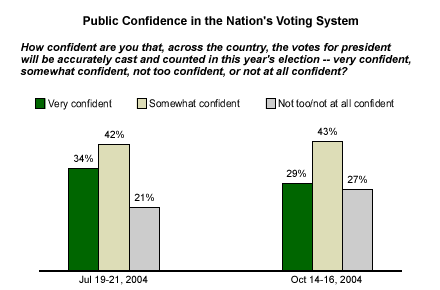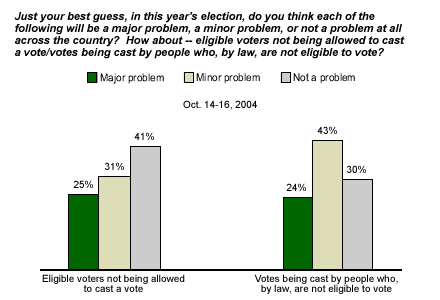Despite some early controversies in key states, Americans are not convinced that instances of voter fraud, such as eligible voters being denied the opportunity to vote or ineligible voters being permitted to vote, will be major problems plaguing this year's elections. Americans also remain confident that votes across the country will be accurately cast and counted this year, according to an Oct. 14-16 CNN/USA Today/Gallup poll*.
Although early voting has already begun, Americans probably won't know until after Nov. 2 whether this election year will result in another "hanging chad" or "butterfly ballot" fiasco like the one in Florida following the 2000 presidential election. But concerns are mounting about possible voter fraud in 2004.
Numerous states, including the competitive showdown states of Colorado, Minnesota, Missouri, New Mexico, Ohio, and Pennsylvania, are already investigating claims of fraudulent voter registration forms, many of which come from convicted felons or contain forged signatures. Oregon officials have even started a criminal investigation into complaints that a Republican-linked group was purposefully destroying voter registration forms filled out by Democratic voters in the state.
Confidence in the Voting Process
Nevertheless, more than 7 in 10 Americans are at least somewhat confident that votes for president will be accurately cast and counted this year, including 29% who are "very" confident. Roughly one in four adults nationwide are "not too confident" (21%) or "not at all confident" (6%) in the country's voting process.
Since Gallup last asked this question in July 2004, the overall level of public confidence that votes will be cast and counted accurately has shown little change. But the percentage of Americans who say they are very confident in the voting process has decreased slightly. In July, 34% of Americans said they were very confident in the nation's voting process, compared with 29% in October.

Although a majority of both Republicans and Democrats express some degree of confidence in the nation's voting system, Democrats are far less confident than Republicans. The current poll shows that 59% of Democrats say they are least somewhat confident that their votes will be cast and counted (including just 13% who are very confident), compared with nearly 9 in 10 Republicans (87%, including 44% who are very confident). A similar gap existed between Republicans and Democrats when the question was asked in July.
Voter Fraud?
Most Americans do not think incidents of voter fraud will be a major problem in this year's election, but a majority expect they will at least be a minor problem.
One in four Americans (25%) say "eligible voters not being allowed to cast a vote" will cause major problems across the country in this year's election. An additional 31% say voters not being able to cast their votes will only cause minor problems in the election, and 41% say it will not cause any problems at all.
When Americans are asked if "votes being cast by people who, by law, are not eligible to vote" will cause problems across the country this year, roughly the same percentage (24%) say it will cause major problems. More than 4 in 10 Americans (43%) say votes cast by ineligible voters will cause minor problems. Thirty percent say votes cast by ineligible voters will not cause any problems at all.

Democrats are slightly more likely than Republicans to say that eligible voters not being allowed to vote will be a major problem in the election, by a margin of 30% to 20%. Partisans do not differ significantly in their views of the extent to which ineligible voting will cause problems in this year's election.
*Results are based on telephone interviews with the 493 national adults in the Form A half-sample and 520 national adults in the Form B half-sample, aged 18 and older, conducted Oct. 14-16, 2004. For results based on the total sample of national adults, one can say with 95% confidence that the maximum margin of sampling error is ±3 percentage points.
